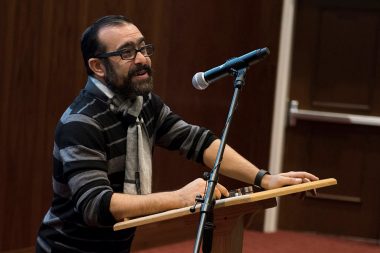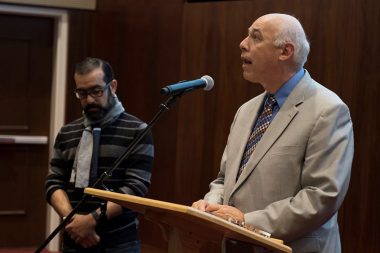The Elon University alumnus and acclaimed filmmaker was recognized as part of the grand opening celebration of the school’s new high-definition movie theater in Dwight C. Schar Hall.
Long before his career included an Oscar nomination — or an alumni award from his alma mater — Laith Majali ’05 was once a fledgling undergraduate on Elon’s campus, growing more comfortable in an unfamiliar culture while studying the equipment of his new passions: filmmaking and photography.

During his acceptance of the school’s Outstanding Alumni Award, presented at the grand opening, Majali explained the significance of his college experience.
“Elon is both my first home in the U.S. and it’s where my career in film and photography really began,” he said.
While he lamented not getting to use today’s first-rate facilities in Turner Theatre or enjoy the beauty of Snow Family Grand Atrium as a student, Majali noted Elon provided other valuable resources, especially in terms of mentorship and friendship.
“Elon University and my professors gave me the student-centered education that I wish all university students can have — instruction through experience that got me ready for my career and the so-call real world,” he said.
That preparation, Majali recalled, included many lessons, beginning with the first time he was asked to film a Phoenix football game.
“When I first arrived on campus, [Assistant Professor] J McMerty gave me a video camera and threw me down on the sidelines of Rhodes Stadium. I had never watched a football game before. And I filmed every fake pass — following the runner, not the ball,” he laughed.
Yet Majali, the university’s first King Hussein of Jordan Scholar, soon thrived stateside and at Elon. He quickly distinguished himself as an Elon community leader, becoming an Isabella Cannon Leadership Fellow and Elon Ambassador. Additionally, he was active in campus media, regularly volunteering to videotape athletics events and Elon Student Television programs.

“As an Arab, Laith became a unifying voice at campus gatherings and, over the years, became a magnificent leader through campus organizations and student media,” the dean said.
Majali concluded his remarks with acknowledgments of his professors, instructors and the Elon community, including Warren G. “Dusty” Rhodes, a life trustee at Elon, and his wife, Peggy. The Rhodes attended the screening with other invited guests and the School of Communications community.
“A lot of people helped me throughout my years and throughout my time (here), and I wouldn’t be where I am today without your help,” he said. “Please know that isn’t taken for granted; it is really appreciated.”
For Bryan Baker, manager of Turner Theatre and the school’s director of sound and video projects, it seemed only right to open the theater with a screening of Majali’s latest project.
“Laith was a special student when he was here, and he set the mold for the type of student we hope to have,” Baker said. “He was passionate about filmmaking, but also photography and other art forms. He immersed himself in these pursuits.”
During Majali’s undergraduate career, it wasn’t uncommon for faculty and staff members to find him asleep in the editing suites in the morning, having nodded off while waiting for his projects to render, Baker recalled. “That’s the type of work ethic Laith has,” he said. “He found out what his passion was and he’s constantly working to feed that passion.”

In 2004, Majali landed a film internship in Los Angeles, where he met fellow Jordanian filmmaker Amin Matalqa. The two collaborated on “Captain Abu Raed,” the first feature film to emerge from Jordan in 50 years. Two years after winning the World Cinema Audience Award at the 2008 Sundance Film Festival, Majali returned to campus to deliver Elon’s Commencement address to the class of 2010.
According to Baker, Majali routinely leads editing workshops with the Elon in LA program, collaborating with McMerty, who serves as the program’s director. He also makes himself available to alumni living and working in Los Angeles.
Just this week Majali visited three separate communications classes, including Assistant Professor Youssef Osman’s “Producing for the Screen” course. After viewing the students’ final projects, mainly of them still rough cuts, he provided feedback and encouragement.
“Laith has always been helpful to the School of Communications — and connected to this university,” Baker said. “And we’re proud to say that he is one of ours.”


